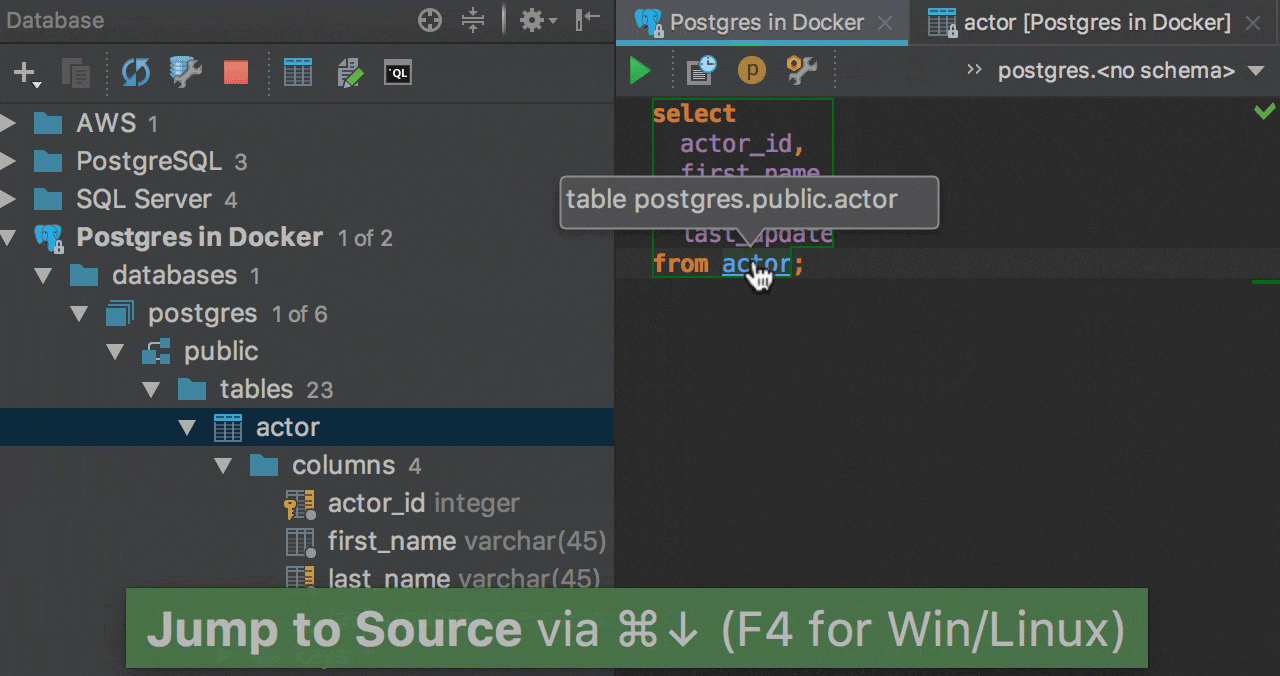Technically, SQL is case-insensitive.
Practically, you want to capitalise the commands anyway.
It gives your code some gravitas. Always remember that when you’re writing SQL statements you’re speaking Ancient Words of Power.
Does that JavaScript framework that got invented 2 weeks ago by some snot-nosed kid need Words of Power? No. Does the database that has been chugging on for decades upon decades need Words of Power? Yes. Words of Power and all the due respect.
SeLEct uSERnaMe frOm usERs WhErE fiRStnAmE = ‘John’;
I’m going to print this out and frame it on the wall of my office.
This sounds like something James Mickens would write.
My favourite by him: The Night Watch (PDF)
My God, that’s hilarious, thank you for sharing it. I enjoyed “I am like the Statue of Liberty: I accept everyone, even the wretched and the huddled and people who enjoy Haskell.”
Whoops, I accidentally deleted my comment. Here’s the link again for posterity: https://www.usenix.org/system/files/1311_05-08_mickens.pdf
Speaking as a Senior Dev specialized in database access and design… you don’t have to use all caps - SQL is actually case agnostic.
But… but my fucking eyes man. I’m old, if your branch doesn’t have control keywords in all caps I’m going to take it out back and ol’ yeller it.
There are few hills I’ll die on but all caps SQL and singular table names are two of them.
is syntax highlighting not sufficient to recognize the keywords?
Singular table names? You savage…
It’s an English literacy thing - we have several non-native English speakers and using only singular avoids making those folks’ lives harder. Besides it’s really nice to autopilot that
categoryidis a foreign key to thecategorytable. It also simplifies always plural words… I haven’t yet writtenCREATE TABLE pantsbut if I ever do there’s zero chance of me creating apantid.no underscores either? What are we, apes?
I’m a sql developer, and I am completely the opposite to you. I will find it incredibly difficult to read when everything is in caps
You should do a project together
The place I work decided to name all tables in all caps. So now every day I have to decide if I want to be consistent or I want to have an easy life.
That’s just cruel.
Fuuuuck. That’s why I love postgres… and fuck anyone that requires double quoted identifiers for special casing.
Postgres normalizes table and field names to lowercase, unless you put them in quotes. It’s also case sensitive.
That means if you use quotes and capital letters when creating the table, then it’s impossible to refer to that table without using quotes.
It also means if you rename the table later to be all lowercase, then all your existing code will break.
Still a much better database than MySQL though.
MySQL gives you a half-hearted “Bye” when you exit the console.
My favourite MySQL error is “MySQL server has gone away”, like MySQL decides “nah I don’t want to run this” and runs off.
(it happens when no data is sent over the connection for a while, like if the query is taking too long to run and times out)
MongoDB does it, too. So it’s not exclusively a SQL thing.
THANKS, NOW I DON’T HAVE TO HOLD DOWN THE SHIFT KEY WHEN I TYPE ANYMORE!
If you guys think that’s cool you should see what I can do with a double negative.
What you can’t not do with a double negative?
In english a double negative only reinforces the no if i rember correctly
Yes and no. Correct English does not use a double negative, but when it is used it can either reinforce or convey the opposite… which is why we don’t use double negatives, it’s confusing and language should be clear and precise when used properly.
In english a double negative is a positive, and is syntactically incorrect.
What if someone says “no no” or “no dont”. That conveys a negative response despite being two negatives. Granted these aren’t proper English or full sentences, but it’s something you might say
“No, don’t [do that]” is not a double negative, it’s just two independent negatives in a row, they don’t affect each other. A double negative would be like “don’t not do that” which will mean “do not fail to do that” to most people.
Nobody knows (/s) but you don’t have to write keywords in upper case (for most DB’s default settings anyway).
You can even write them sarcastically like this:
sElEcT * fRoM dUaL
You have ruined my assumptions of SQL coders. How dare you! /s /dramatic
Yeah… But caps lock is the cruise control for cool. How else am I going to switch between Slack and my editor easily?
I never use all caps when I write SQL, not sure why people insist on it so much
I write it in lowercase but then the auto-formatter we use at work converts it to uppercase when I save the file.
I love auto formatters. Prettier (the initial version for JS) really popularized the concept. If the coding style is automated where possible (things like tabs vs spaces, tab width, line wrap at 80/100/120 characters, where to put line breaks in long statements, etc), it ensures the entire codebase is consistent, and I can jump between different code bases with different coding styles without having to think too much about it.
I was taught it when working with Oracle SQL (their certification was not cheap and the exam also not easy)
Personally do what’s easiest if it’s your own database
Was an Oracle thing. Postgresql is rather on the lowercase side of things…
It feels important when it’s bold. To the untrained eye, maybe even impressive.
I dunno, I don’t need it to be important, I need it to work and be readable and, to me, all caps is unreadable
The more you look away the bigger the text gets to grab your attention!
MAKING SQL QUERIES IN CAPITAL LETTERS MAKES DATABASE TO SENSE URGENCY AND RUN FASTER.
The mental gymnastics needed to understand joins 😂
It’s basically just a VLOOKUP is how I explain it to my friends who might be familiar with excel but not a real database.
If you know vlookup, you should checkout xlookup. Even more similar, relatively speaking of course. No longer do I have to count my columns
Writing SQL on Mac sucks so bad. I hate their caps lock time out
macOS has a caps lock timeout? The fuck…
capslock drains the battery too quickly
I always remap my tab key to ctrl. Where is your god now…
Remapping caps lock to Ctrl I can see (and have done), but Tab…? Do you just indent with the space bar
Yes, WHY do I write all my SQL statements In all CAPS and why isn’t there a better SQL editor, and why hasn’t SQL evolved more than it has?
Well I like this way, makes it easy to understand and read. My IDE has a good SQL editor and I can see it perfectly and well formatted and colored…

The phrase “SQL programmers” is so fucking weird. SQL isn’t a programming language. It’s a query language. You don’t “program” things with SQL. You utilize SQL as a component of programs for data insertion and lookup, but the actual logic of execution is done in a programming language. Unless you’re doing Oracle PL/SQL, in which case why are you giving money to Oracle?
Edit: Damn, this comment made people mad.
Your knowledge of data engineering may be limited. SQL is predominant in data processing nowadays. FOSS tools such as DBT allows to write efficient data processing pipelines with SQL and some YAML config without the need for a general purpose coding language.
Why would anyone want that? Because SQL has the interesting property of describing the result you want rather than describing how to compute it. So you can put inside the database, a query engine with decades of optimizations, that will make a much better job at finding the best execution plan than the average developer.
It also means it’s easier to train people for data processing nowadays.This doesn’t make sense to me. SPs and functions are in every major database. If I wrote a bash script that runs like a program, and sounds like a program, did I program it? Script it?
And lots of systems have nested logic in the DB, optimization often leads to that to reduce overhead. Unless you’re being lazy with an ORM like prisma that can’t even join properly.
Getting high performing queries is just as difficult as any other programming language, and should be treated as such. Even Lemmy’s huge performance increases to .18ish came from big PG optimizations.
It seems to be about yelling at others that “you’re not a real programmer!!!” mixed with being so “technically correct” my eyes can no longer roll the same way they used to.
Admittedly, this discussion is more one of semantics than anything. It’s pretty clear I’m arguing that SQL is not a “General Purpose Language,” and that proficiency in that domain is what constitutes programming. Which, yeah, is arguably somewhat arbitrary. But my point is that, colloquially, someone who only works with SQL isn’t a programmer. Data Engineer, sure. DBA. Also, sure. Depends on what you do. Programmer? Not really. Not unless you (as in the person, not “it’s theoretically possible”) can use raw SQL to read in video data from a linux system device file and then encode it to mp4 and just nobody’s told me.
Do that in Javascript. Or HTML. Or CSS. Or by that logic is a web developer not a programmer? What about microcontroller programmers?
I could easily write a full logic program in SQL where the API just feeds it data, which is the inverse of how you treat SQL. Admittedly that’s not as common, but it happens pretty frequently in areas of big data, like medical.
I’ve hired Senior Software Engineers that were DBAs, and others that weren’t. They were a development team, all programmers in their own right.
T-SQL is turing complete. While the MS SQL server has limitations on OS level operations, if you allow yourself some leeway with CLR wrappers for the win32 API, there’s no reason I can think of you wouldn’t be able to get the database engine to be a webserver reacting to incoming requests on port 80, or drawing GUIs based off of table state.
It’s be slow and terrible, but doable.
It’s doable. Personal experience
SQL is turing complete
So is PowerPoint
So is Magic: The Gathering
I’m a magic the gathering programmer
So is Tex. And, yet, I still don’t put it under the “programming languages I know” section on my resume. Probably because it’s not a programming language.
What section would you put it under? It isn’t clear to me where it would fit
Where you put it is not my problem.
The general census is that latex actually is an example of programming languages sharing semantics with non programming languages and not being intend as a programming language.
since you linked to wikipedia:
The domain of the language is also worth consideration. Markup languages like XML, HTML, or troff, which define structured data, are not usually considered programming languages.[12][13][14] Programming languages may, however, share the syntax with markup languages if a computational semantics is defined. XSLT, for example, is a Turing complete language entirely using XML syntax.[15][16][17] Moreover, LaTeX, which is mostly used for structuring documents, also contains a Turing complete subset.[18][19]
Sometimes even non Turing complete languages are considered a programming language but Turing completeness usually is the criteria agreed upon:
The majority of practical programming languages are Turing complete,[5] and all Turing complete languages can implement the same set of algorithms. ANSI/ISO SQL-92 and Charity are examples of languages that are not Turing complete, yet are often called programming languages.[6][7] However, some authors restrict the term “programming language” to Turing complete languages.[1][8]
You don’t “program” things with SQL
Why not? It sounds like you haven’t written any OLAP queries :)
I’ve written ETL data pipelines using a system similar to Apache Airflow, where most of the logic is in SQL (either Presto or Apache Spark) with small pieces of Python to glue things together. Queries that are thousands of lines long that take ~30 minutes to run and do all sorts of transformations to the data. They run once per day, overnight. I’d definitely call that programming.
Most database systems support stored procedures, which are just like functions - you give them some input and they give you some output and/or perform some side effects.
thousands of lines long that take ~30 minutes
Oh yea!!! Well I have 76 lines of code that takes up to 18 hours to run for 1 client!!!
/s
Haha I only mentioned the run time to provide some context, since a lot of people have only ran OLTP queries that take less than a few seconds to run.
I’m a markdown programmer and i disagree with this statement
LaTeX being called “programming” I can see, but I’ve never heard someone try to justify Markdown as programming. It’s just formalizing things people were already doing to format text in plain text files into approximately half of a standard.
stored procedures
deleted by creator
This comment has a concerning amount of replies. Its just semantic BS.
Most database engines support stored procedures. You don’t need to give money to oracle, you can give it to Microsoft instead.
I stopped doing SQL (the language/syntax) because I use ORMs now. They make the job a bit easier, especially when doing table relations.
UM ACKSHULLY SQL ISN’T CASE SENSITIVE ☝️🤓



















